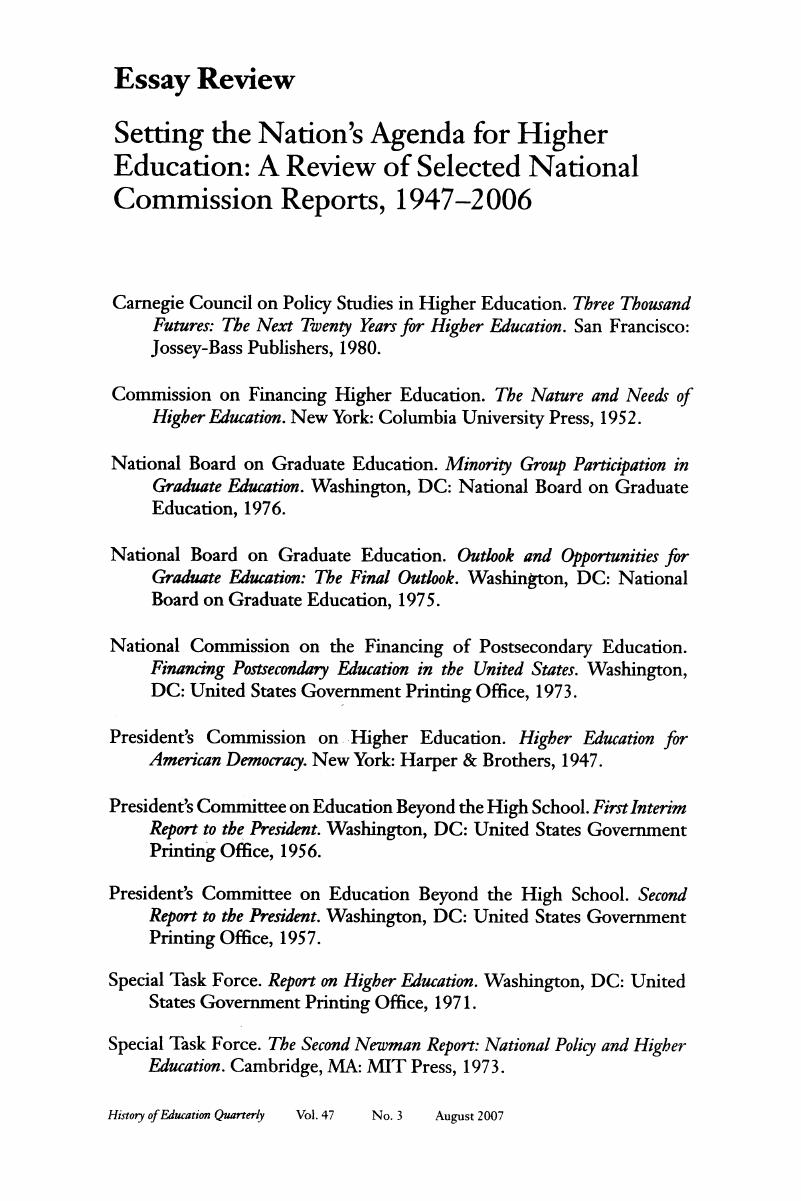Published online by Cambridge University Press: 24 February 2017

1 President's Commission on Higher Education, Higher Education for American Democracy (New York: Harper & Brothers, 1947), vol. 2, 26.Google Scholar
2 On the substantial response to the 1947 President's Commission, see Hutcheson, Philo A., “The 1947 President's Commission on Higher Education and the National Rhetoric on Higher Education Policy,” History of Higher Education Annual 2002 22 (2003): 91-107.Google Scholar
3 Commission on Financing Higher Education, The Nature and Needs of Higher Education (New York: Columbia University Press, 1952), 46 on discrimination, footnote (unnumbered) on 47 regarding the 1947 President's Commission, and 47-52 on top 25 percent.Google Scholar
4 Ibid., 157-158.Google Scholar
5 Ibid.Google Scholar
6 President's Committee on Education Beyond the High School, Second Report to the President (Washington, DC: United States Government Printing Office, July 1957), 3.Google Scholar
7 President's Committee on Education Beyond the High School, First Interim Report to the President (Washington, DC: United States Government Printing Office, November 1956), 18.Google Scholar
8 Ibid., 44, 45.Google Scholar
9 Ibid., 55, 56.Google Scholar
10 The 1957 Soviet launch of Sputnik generated a substantial part of those changes as politicians concluded that the nation needed a better educational system.Google Scholar
11 Sundquist, James L., Politics and Policy; the Eisenhower, Kennedy, and Johnson Years (Washington, DC: Brookings Institution, 1968); and Graham, Hugh Davis, The Uncertain Triumph: Federal Education Policy in the Kennedy and Johnson Years (Chapel Hill: University of North Carolina Press, 1984).Google Scholar
12 President's Commission on Higher Education, vol. 1, 43; President's Committee on Education Beyond the High School, Second Report to the President, 3; Digest of Educational Statistics Tables and Figures, Table 170, available online http://nces.ed.gov/programs/digest/d05_tf.asp, retrieved January 22, 2007.Google Scholar
13 Ibid., 49.Google Scholar
14 Ibid., 51 and 56. On women and individual choice, see Linda Eisenmann, Higher Education for Women in Postwar America, 1945-1965 (Baltimore, MD: Johns Hopkins University Press, 2006).Google Scholar
15 Special Task Force, Report on Higher Education (Washington, DC: United States Government Printing Office, March 1971), 5-7.Google Scholar
16 Ibid., 74, and Special Task Force, The Second Newman Report: National Policy and Higher Education (Cambridge, MA: MIT Press, 1973), 104-105.Google Scholar
17 Ibid., 134-154.Google Scholar
18 National Board on Graduate Education, Outlook and Opportunities for Graduate Education: The Final Outlook (Washington, DC: National Board on Graduate Education, 1975).Google Scholar
19 National Board on Graduate Education, Minority Group Participation in Graduate Education (Washington, DC: National Board on Graduate Education, 1976), 1.Google Scholar
20 Ibid., 58.Google Scholar
21 On Jencks, and Riesman, , and one unequivocal response to their work, see Christopher Jencks, and Riesman, David, The Academic Revolution (New York: Anchors Books, 1969 edition); and Willie, Charles V. and Edmonds, Ronald R., eds., Black Colleges in America: Challenge, Development, Survival (New York: Teachers College Press, 1978).Google Scholar
22 National Board on Graduate Education, Minority Group Participation in Graduate Education (Washington, DC: National Board on Graduate Education, 1976), 148.Google Scholar
23 Ibid., chap. 6, “Current Efforts to Promote Minority Participation,” 161-187.Google Scholar
24 Carnegie Council on Policy Studies in Higher Education, Three Thousand Futures: The Next Twenty Years for Higher Education (San Francisco: Jossey-Bass Publishers, 1980), 6.Google Scholar
25 Ibid., 91 and 96.Google Scholar
26 National Commission on Excellence in Education, A Nation at Risk: the Imperative for Educational Reform: A Report to the Nation and the Secretary of Education (Washington, DC: United States Government Printing Office, 1983).Google Scholar
27 Ibid., xi.Google Scholar
28 Ibid., 1 and xiii.Google Scholar
29 Weber, Max, The Protestant Ethic and the Spirit of Capitalism, trans. Talcott Parsons (New York: Charles Scribner's Sons, 1920-21/1958).Google Scholar
30 President's Commission on Higher Education, vol. 1, 8.Google Scholar